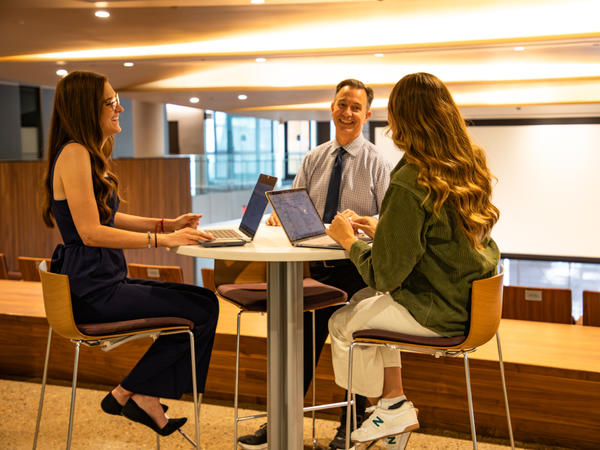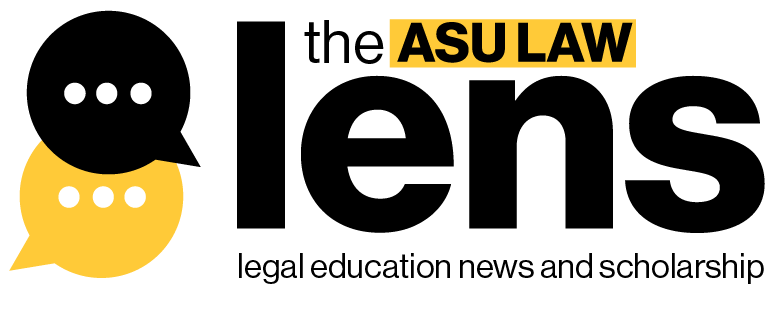
How ASU Law clinics empower students through real-world legal experience
At the Sandra Day O’Connor College of Law at Arizona State University, clinical programs are more than classes — they transform students into practicing lawyers. Since 1969, clinics have placed students in the driver’s seat, handling real cases, serving clients and making a tangible community impact.
“Across ASU Law’s clinics, students don’t just learn the law, they practice it,” said Art Hinshaw, associate dean for experiential learning and director of the Lodestar Mediation Clinic. “From helping small businesses and inventors to protecting constitutional rights and advocating for those who’ve been wrongfully convicted, students gain real-world experience while making a meaningful difference.”
From civil advocacy to dispute resolution, ASU Law’s 10 clinics prepare students for careers across the legal system.

Civil and rights-focused clinics
ASU Law’s civil and rights-focused clinics give students the chance to advocate for justice, serve vulnerable communities and build essential lawyering skills.
“Whether a student is representing a client in court, drafting a legal brief or guiding someone through a complex legal process, these clinics teach practical skills that cannot be replicated in a classroom,” said Patty Ferguson-Bohnee, associate dean for inclusive excellence and director of the Indian Legal Clinic.
Civil Litigation Clinic
Student attorneys in the Civil Litigation Clinic are certified by the Arizona Supreme Court to represent clients who cannot afford legal counsel. They handle cases including consumer fraud, employment discrimination, unemployment insurance benefits, wage claims and tenant rights. Students take part in every stage of a case, from client interviews and fact investigation to drafting pleadings, motions and conducting discovery. Many represent clients in trials, arbitrations and mediations, gaining direct courtroom and negotiation experience while providing vital legal services.
First Amendment Clinic
Students in the First Amendment Clinic work on free speech and civil rights matters. They defend libel and invasion-of-privacy suits, argue to unseal court records, assist in First Amendment claims, write friend-of-the-court briefs and provide pre-publication guidance for authors. This experience helps students develop litigation and advocacy skills while engaging with important constitutional issues.
Immigration Clinic
The Immigration Clinic gives students the chance to represent individuals navigating complex immigration matters. Students take the lead on interviewing, issue spotting, research, analysis and counseling while receiving guidance from clinical professors. The clinic emphasizes ethical practice while helping vulnerable populations with asylum, residency, work authorization and other relief, including appearances in immigration court.
Indian Legal Clinic
Students in the Indian Legal Clinic represent Native American and Alaska Native clients in Tribal, state and federal courts. They work on criminal and civil matters, participate in Tribal legal development projects such as drafting codes and court rules and engage with federal policy issues, including voting rights and federal recognition. The clinic provides essential legal services while giving students unique exposure to Tribal and Federal Indian Law.
“Through projects like the Native Vote election protection program, our students see the real impact of their work,” Ferguson-Bohnee said. “They lead volunteer training, respond to voting issues on the ground and help ensure people’s rights are protected. These experiences teach skills and judgment that go far beyond what a classroom can offer.”
Business-focused clinics
From guiding entrepreneurs to safeguarding intellectual property and fostering innovation, ASU Law’s business-focused clinics give students the chance to develop the practical lawyering skills that make them ready for practice.
Patent Clinic
The Patent Clinic provides hands-on experience in patent and trademark prosecution. Students obtain limited recognition practice numbers through the U.S. Patent & Trademark Office’s Law School Clinic Certification Program, allowing them to represent clients directly before the USPTO. Students with science or engineering backgrounds work on patents and trademarks, while others focus on trademarks, preparing applications, responding to office actions, conducting examiner interviews and handling official correspondence.
Entrepreneurship and Small Business Clinic
Pairing inventors, entrepreneurs and emerging companies with ASU Law students, the Entrepreneurship and Small Business Clinic provides legal services often unavailable to startups. Clients gain a stronger legal foundation while students develop real-world transactional practice skills that prepare them for careers after graduation.
Criminal justice clinics
Through ASU Law’s criminal justice clinics, students step into the roles of defender, prosecutor and post-conviction advocate. These experiences expose them to the human realities of criminal law and prepare them with the skills, judgment and perspective required for practice in the justice system.
“In criminal justice clinics, students see the human side of the law and the power of effective advocacy,” said Randy McDonald, supervising attorney at the Post-Conviction Clinic.
Post-Conviction Clinic
Students in the Post-Conviction Clinic investigate claims of wrongful conviction and manifest injustice for prisoners in Arizona. Working with the Arizona Justice Project, students gain experience in criminal law and procedure while addressing systemic issues in one of the country’s highest-incarceration states. Their work contributes to national efforts that have led to more than 1,500 exonerations, including more than 400 through DNA testing.
Public Defender Clinic
Under attorney supervision, students in the Public Defender Clinic represent indigent clients in Maricopa County Superior and Justice Courts. They interview clients and witnesses, draft motions and handle hearings, plea proceedings, settlement conferences, sentencing, evidentiary hearings and jury trials. A mandatory trial advocacy seminar develops courtroom skills in opening statements, closing arguments, direct and cross-examinations and voir dire, with feedback from professors, experienced attorneys and judges.
Prosecution Clinic
In the Prosecution Clinic, students act as Certified Limited Practice Students prosecuting misdemeanor and felony cases under attorney supervision. They prepare cases for trial, conduct hearings and gain hands-on courtroom experience with the goal of participating in at least one jury trial. Classroom instruction complements in-court work, covering opening statements, examinations and closing arguments.
Alternative dispute resolution
Lodestar Mediation Clinic
Part of the nationally recognized Lodestar Dispute Resolution Center, this clinic teaches alternatives to litigation while providing practical mediation experience. Students complete intensive training in theory, strategy and skills, then act as mediators in civil cases. They also shadow and co-mediate with professional mediators from the EEOC and judges and mediate federal EEOC claims under supervision.

Preparing leaders, serving communities
ASU Law clinics give students hands-on experience while serving the community. In academic year 2023–24 alone, students served over 400 clients and logged more than 2,000 hours of work, providing vital legal services and making a tangible impact. By working on real cases and engaging with diverse legal issues, students graduate prepared to excel in the legal profession.
“Our students make a real difference in people’s lives, whether it’s securing justice for the wrongfully convicted or helping a small business thrive,” said Hinshaw. “By the time they graduate, our students aren’t just prepared to become lawyers — they’re leaders ready to make an impact in the profession and the community.”
Written by Andrea Estrada
For the media
Legal studies research
Legal experts list
Media resources
Faculty directory
Staff directory
For all press and media inquiries, please contact: Kourtney Kelley, Assistant Director of Communications
[email protected]
480-965-6197
